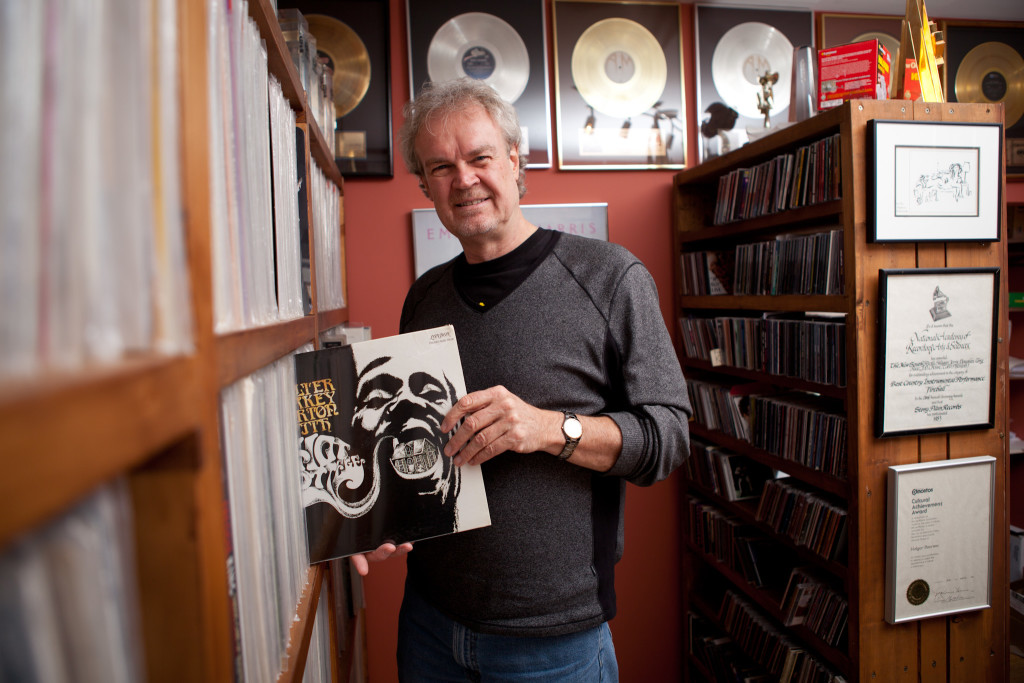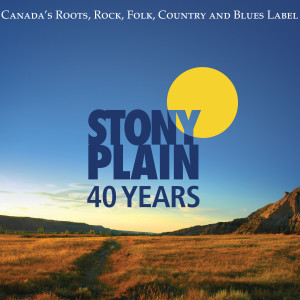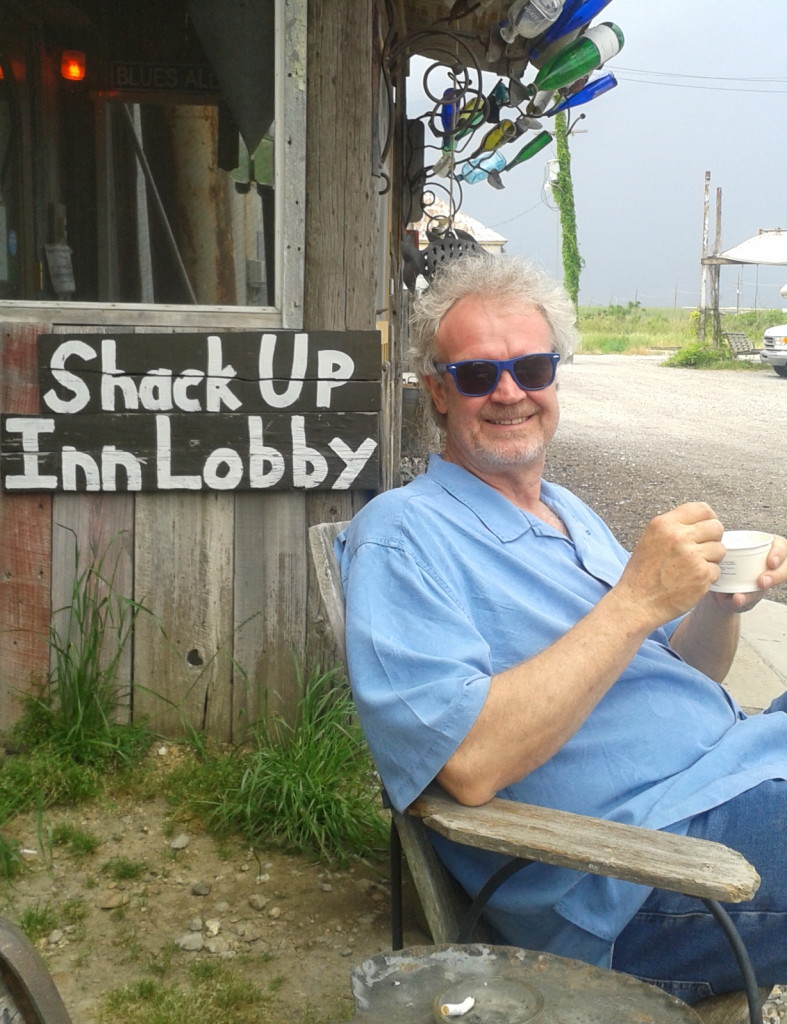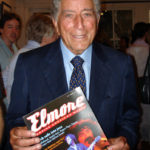
By Jim Hynes
[O]k, true, Stony Plain puts out an anniversary collection every five years, but not many independent labels have been in business for forty years. So 40 Years of Stony Plain Records, the just released retrospective, is truly special – a three disc set with Singer/Songwriters covered on Disc One, Blues, R&B, Gospel and Swing on Disc Two and Rarities and Previously Unreleased Material on Disc Three. The sheer breadth of the artists included is amazing, from Emmylou Harris, to Ian Tyson, to Jay McShann, to Sam Chatman (of The Mississippi Sheiks), to Walter “Shakey” Horton. And, of course, I’m leaving out a whole host of contemporary artists that are the lifeblood of the label today; 47 songs and extensive liner notes shed light on many of them. In the past four decades, the label has earned six Grammy nominations, 11 Juno Awards, 20 Maple Blues Awards and Canadian Country Music Association awards as well, and in 2014, they were named Label of the Year by the Blues Foundation. Elmore had the opportunity to talk to Holger Petersen, the label’s Founder and jack-of-all-trades, from President to CFO, engineer to producer. On top of that, he’s a published author and a radio host; in 2008, he was named Broadcaster of the Year by the Blues Foundation. He told us all about his love for music– especially the blues– that cuts across multi-media, and what it’s like, four decades and 400 albums after creating Stony Plain Records at the kitchen table of his house in Edmonton, to be widely regarded as Canada’s preeminent voice on the blues.
Elmore Magazine: What was the vision for Stony Plain when you started, and how has that changed from the vision of today?
Holger Petersen: It was not much of a vision when we started. When I was shopping for an outlet for these records I was producing, it became evident early on that maybe I should just do it myself. I started with Walter “Shakey” Horton and I was listening, reading about, and learning as much as I could about blues music. Soon I began working with Johnny Shines, and we did two records and then I worked with Roosevelt Sykes. I was really inspired working with these artists. That’s how it began, and because I like singer/songwriters too, the label began to move in that direction.
 EM: I was a bit surprised to see artists like Emmylou Harris, Steve Earle, and Rodney Crowell amidst the likes of Ian Tyson and Corb Lund on Disc One. How did that come about?
EM: I was a bit surprised to see artists like Emmylou Harris, Steve Earle, and Rodney Crowell amidst the likes of Ian Tyson and Corb Lund on Disc One. How did that come about?
HP: Those albums came out on small labels and we had the Canadian rights. We have worldwide rights with all of our artists now except for Eric Bibb, who we have for North America. (Note: Stony Plain also had the rights for Blind Pig in Canada for many years.)
EM: With the original focus on blues and certainly on Canadian musicians, how did you sign so many of these great players in the states like Duke Robillard, Ronnie Earl, Rory Block, and Maria Muldaur?
HP: This is mostly because of love and respect for the music. We’ve done over 25 projects with Duke Robillard who I met in 1992. I enjoyed meeting him and admired his respect for the music. He was on Virgin/Pointblank at the time, and we talked about doing a straight-ahead blues album just for Canada and issued Duke’s Blues, which Virgin/Pointblank liked so much they issued it too. As I got to know him, I also saw him as a producer. The first record Duke produced for Stony Plain was for Jimmy Witherspoon, called Spoon’s Blues. This led to some amazing stuff, like Jay McShann and Roscoe Gordon. I had heard all those great records Ronnie Earl did for Blacktop, and went to a show at House of Blues in Boston where Ronnie and Duke were both playing. That’s when I got the idea to do an album with both of them, and eventually we did Duke and the Earl which I am very proud of. At that time we had already done a couple of albums with Ronnie. And, of course, I love the traditional blues and have been fortunate to work with two of the best female blues artists in the business for many projects, Rory Block and Maria Muldaur.
EM: Many of your artists are quite prolific. Is that in their nature or is it your encouragement, or both?
HP: It has everything to do with them. It is artist driven. I am patient. Some folks like Duke, Ronnie, and Eric Bibb are very prolific, while I can wait on people like Rory, Maria and Paul Reddick.
EM: How do you go about signing artists?
HP: We release only about eight records a year, so we only sign one or two artists a year. My criteria are that the artists must make timeless music, are great songwriters or composers, and have a strong sense of themselves as artists.
EM: Which artist or artists- whom you felt you were taking a bit of a chance on- surprised you the most?
HP: The first one who comes to mind is Long John Baldry. He had a major career in Canada and many hit records. I approached him to do a blues records and was open to commercial projects too. We did lots of good work together. The other is Jeff Healey. When he came to me, he said he didn’t want to do any more blues-rock records and wanted instead to move into the vintage jazz area. He did those, and then came back to do two more rocking blues albums. I just wished I would have met him earlier and that he had lived longer. His passion was amazing, and he could have done more great work.
EM: What makes you most proud over these 40 years?
HP: It’s the long term relationships I’ve had and continue to have. Since the early eighties I’ve always wanted to keep the company small and have a hands-on approach. We’ve had artists like Ian Tyson that we’ve done 11 albums with, Duke Robillard with more than 20 original releases, and at least half a dozen or more that he’s produced, Ronnie has done eight, and Maria, as well as Eric Bibb, has done six.
EM: If you could change one thing about the music business what would it be?
HP: I would love to have people pay for music rather than getting it free.

EM: Describe the blues scene in Canada. How is it different from the states– or is it?
HP: There are great pockets of blues in Canada – in the Maritimes, in Quebec, which is really unique due in part to their great festivals, but lots of CDs are sold there. Of course, we have strong blues societies and festivals, both blues and eclectic ones that feature blues artists. Western Canada in Alberta and BC are both strong. Canadians seem to know more about Canadian artists than those from the states. Of course, we’ve had a tradition of the major blues artists from the states playing in Canada for years. We’ve never had segregation here.
EM: Here’s a little challenge for you. If you can only pick five artists from any era to play who would they be?
HP: They would be B.B. King, Muddy Waters, Mavis Staples, Ry Cooder and Robert Johnson.
EM: Okay, back to the anniversary set – Did you select the tracks? What thought went into the sequencing?
HP: You know how the discs are organized, and I tried to get representation from every artist, but what I’m most excited about is the third disc – Rarities and Previously Unreleased Material. For example, I’ve known Colin Linden since he was 14 years old. Colin went to Mississippi when he was 19 and recorded with Sam Chatman of the Mississippi Sheiks, who at that time were Sam Chatman and his Barbecue Boys. Colin sat in with them and we have two tracks here. Also, my very first recording was with Walter “Shakey” Horton with his wonderful harmonica tone. I did that in 1972, and actually mixed it in London in the same studio where the Rolling Stones recorded. So, it is here for the first time on record.
EM: Are there any major celebratory plans behind this fortieth anniversary…showcases at festivals?
HP: Yes, I’m pretty excited. There will be a special Stony Plain focus at The Edmonton Folk Festival, which I am the founder of. There will also be a tribute at a blues festival in Edmonton and at the Island Music Festival in Vancouver.
EM: Tell us about your radio shows…
HP: One thing is I am very self-conscious of Stony Plain. I never mention the name, and probably play less of my artists than other shows do. This is my thirtieth year on CBC Radio One and Two as the host of Saturday Night Blues, heard also on Sirius Channel 169. I do at least one interview on every show and have interviewed B.B. King six times, Allen Toussaint three times, and just last week I interviewed John Mayall. I also host Natch’l Blues each week on CKUA here in Edmonton and I’ve been doing that for 47 years.
EM: What’s your next project? Will you be writing another book?
HP: I did my first book called, Talking Blues, five years ago. In October we’ll be releasing Talking Blues 2 through Insomniac Press from Ontario, Canada. Like the first book, it will recap many of the interviews I’ve done.
EM: Can we expect any major changes during the next five years at Stony Plain or just keep counting on great music?
HP: Again, I just feel very fortunate to be doing what I’m doing. I hope it is more of the same. I’m very content with where we are and intend to keep it going.







Be the first to comment!